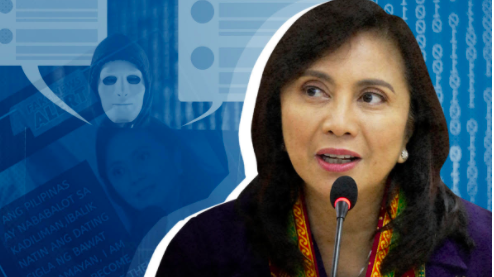
MANILA, Philippines—Vice President Leni Robredo is being cast as the antagonist to President Rodrigo Duterte’s role as the country’s last hope, a description made during the 2016 presidential campaign, by Duterte himself.
This casting made by Duterte and his sycophants is widening the gap further between the soft spoken vice president and the brash, often vulgar president.
That Robredo has been put in a difficult situation is an understatement.
She’s been appointed to the Cabinet, sacked, appointed again, sacked again but mostly blamed for the hostility that Duterte shows her.
For Duterte and his minions, Robredo couldn’t blame anyone else for how Duterte is treating her but herself.
When she said in an interview aired on ANC that she would not wish upon Duterte the treatment she is getting from him, presidential spokesperson Harry Roque was quick to turn the gun on the vice president.
“I will not treat him the way he treated me because I don’t think it is in the best interest of the people that the President and the Vice President are fighting,” Robredo said in the interview in reference to a scenario where she is president and Duterte her vice president.
No bad words against Duterte, no condemnation.
But Roque was quick to pull the trigger. He said Robredo brought Duterte’s hostility upon herself when she decided to lead dissent against the President. This, Roque said, turned Robredo into a “decoration.”
There was no mistreatment by Duterte of his vice president, Roque said.
It is difficult to trace the root of the angry and insulting words that Duterte and his minions throw at the direction of Robredo. Her soft spoken critique of the administration was never known to employ expletives or even a direct reference to Duterte.
Robredo isn’t at all leading dissent. She has been taking light steps to show Duterte that she isn’t a threat.
Roque harked back to the days Robredo was a member of the Cabinet as chair of the government’s Housing and Urban Development Coordinating Council (HUDCC), a position she quit after she was asked not to attend Cabinet meetings.
Robredo said that if the President runs and wins as vice president, she hoped that he will not experience what she went through. “There were many missed opportunities, that if we had many chances to work together, we might have accomplished a lot.”
The real score
In December 2016, five months after trying to set aside her differences with the President to maintain a professional working relationship and to work effectively despite the constraints, Robredo resigned as housing chair, saying “no one can say that I didn’t give it my all.”
During her short stint at the housing sector, red tape was cut, low-cost housing was built for at least 46,000 families and at least 17,000 homes had been built for survivors of Yolanda, the strongest typhoon to ever make landfall in 2013 and which left a path of destruction unprecedented in the history of storms in the Philippines.
As Robredo plodded on in housing, she was asked to desist from attending Cabinet meetings based on the instructions of the President which were relayed by then Cabinet Secretary Jun Evasco.
Two years after that, Duterte designated Robredo as head of the Inter-Agency Committee on Anti-Illegal Drugs (ICAD) alongside the Philippine Drug Enforcement Agency (PDEA) chief then, Aaron Aquino.
Chief Legal Counsel Salvador Panelo, the presidential spokesperson in 2019, said the position gave the vice president oversight function over drug enforcement agencies and offices, including the PDEA, the Dangerous Drugs Board and the Philippine National Police.
But less than a month after working in the middle of an atmosphere of distrust by Duterte and his men and threats that she would be fired if she helped foreign investigations into Duterte’s bloody anti-drug campaign, Robredo was removed from ICAD.
Measly funds
The obstacles Robredo faced did not only revolve around her relationship with Duterte, but was felt by the Office of the Vice President (OVP) which, for years, has been getting the lowest share of the national budget.
In 2016, the OVP had P500 million, but it declined to P428.62 million in 2017. The next year, her office had P543.95 million.
In 2019, the OVP had P671.55 million, higher than the P549 million it proposed. In 2020, it had P708.01 million.
The following year, as the OVP displayed its commitment to serve Filipinos badly hit by the health crisis, lawmakers sought a higher fund for Robredo’s office, but despite their calls, the OVP had the smallest slice of the 2021 budget – P679.74 million, too small if compared to the over P8 billion given to the Office of the President.
Endless attacks
Robredo, since 2016, found herself at the receiving end of the President’s outrageous remarks, including those echoed by his fanatics and other government officials.
Recently, the President hit Robredo for criticizing the government’s COVID vaccination program.
“That’s the hard thing about you, you want to be relevant,” Duterte said, addressing himself to Robredo.
“Sometimes, you make an idiotic stance. Like ‘They deserve the best.’ You’re a son of. Why me? I would give them the worst? You should die. I will not leave the front liners and you do not need to really be redundant about it,” he said.
Robredo was also a victim of many online attacks, including those through the Twitter hashtag #LeniLeaks, which featured an article of rabid pro-Duterte blogger Thinking Pinoy linking Robredo to alleged conversations about how to support the Duterte Resign movement.
Lawyer Barry Gutierez, Robredo’s spokesperson, said “literally every day, her page, her posts and posts about her, are flooded with comments from trolls.”
In 2017, a University of Oxford study said that around P10 million was spent to hire trolls to spread propaganda for Duterte and target his critics.
The study said that the President’s team of 400 to 500 cyber troops post pro-government comments and interact with dissenters through harassment, but Malacañang repeatedly denied involvement in the troll battalions.